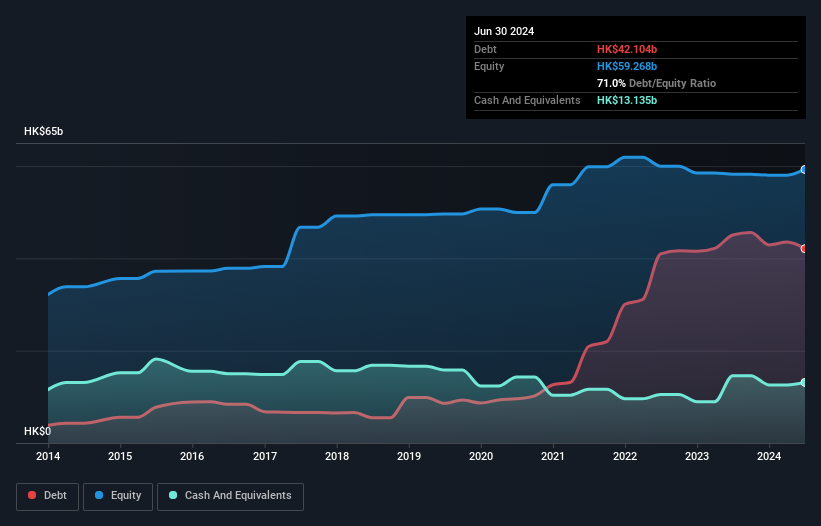Warren Buffett famously said, 'Volatility is far from synonymous with risk.' So it seems the smart money knows that debt - which is usually involved in bankruptcies - is a very important factor, when you assess how risky a company is. We note that Guangdong Investment Limited (HKG:270) does have debt on its balance sheet. But the real question is whether this debt is making the company risky.
When Is Debt Dangerous?
Generally speaking, debt only becomes a real problem when a company can't easily pay it off, either by raising capital or with its own cash flow. If things get really bad, the lenders can take control of the business. However, a more common (but still painful) scenario is that it has to raise new equity capital at a low price, thus permanently diluting shareholders. By replacing dilution, though, debt can be an extremely good tool for businesses that need capital to invest in growth at high rates of return. When we think about a company's use of debt, we first look at cash and debt together.
Check out our latest analysis for Guangdong Investment
How Much Debt Does Guangdong Investment Carry?
As you can see below, Guangdong Investment had HK$42.1b of debt at June 2024, down from HK$45.1b a year prior. However, because it has a cash reserve of HK$13.1b, its net debt is less, at about HK$29.0b.

A Look At Guangdong Investment's Liabilities
According to the last reported balance sheet, Guangdong Investment had liabilities of HK$42.2b due within 12 months, and liabilities of HK$38.4b due beyond 12 months. Offsetting these obligations, it had cash of HK$13.1b as well as receivables valued at HK$9.55b due within 12 months. So its liabilities outweigh the sum of its cash and (near-term) receivables by HK$57.9b.
This deficit casts a shadow over the HK$33.4b company, like a colossus towering over mere mortals. So we definitely think shareholders need to watch this one closely. At the end of the day, Guangdong Investment would probably need a major re-capitalization if its creditors were to demand repayment.
We use two main ratios to inform us about debt levels relative to earnings. The first is net debt divided by earnings before interest, tax, depreciation, and amortization (EBITDA), while the second is how many times its earnings before interest and tax (EBIT) covers its interest expense (or its interest cover, for short). Thus we consider debt relative to earnings both with and without depreciation and amortization expenses.
Guangdong Investment's debt is 3.5 times its EBITDA, and its EBIT cover its interest expense 6.1 times over. This suggests that while the debt levels are significant, we'd stop short of calling them problematic. Unfortunately, Guangdong Investment saw its EBIT slide 3.4% in the last twelve months. If that earnings trend continues then its debt load will grow heavy like the heart of a polar bear watching its sole cub. There's no doubt that we learn most about debt from the balance sheet. But it is future earnings, more than anything, that will determine Guangdong Investment's ability to maintain a healthy balance sheet going forward. So if you're focused on the future you can check out this free report showing analyst profit forecasts.
But our final consideration is also important, because a company cannot pay debt with paper profits; it needs cold hard cash. So we clearly need to look at whether that EBIT is leading to corresponding free cash flow. In the last three years, Guangdong Investment's free cash flow amounted to 26% of its EBIT, less than we'd expect. That's not great, when it comes to paying down debt.
Our View
We'd go so far as to say Guangdong Investment's level of total liabilities was disappointing. Having said that, its ability to cover its interest expense with its EBIT isn't such a worry. We should also note that Water Utilities industry companies like Guangdong Investment commonly do use debt without problems. Overall, it seems to us that Guangdong Investment's balance sheet is really quite a risk to the business. For this reason we're pretty cautious about the stock, and we think shareholders should keep a close eye on its liquidity. When analysing debt levels, the balance sheet is the obvious place to start. However, not all investment risk resides within the balance sheet - far from it. Be aware that Guangdong Investment is showing 3 warning signs in our investment analysis , you should know about...
At the end of the day, it's often better to focus on companies that are free from net debt. You can access our special list of such companies (all with a track record of profit growth). It's free.
New: Manage All Your Stock Portfolios in One Place
We've created the ultimate portfolio companion for stock investors, and it's free.
• Connect an unlimited number of Portfolios and see your total in one currency
• Be alerted to new Warning Signs or Risks via email or mobile
• Track the Fair Value of your stocks
Have feedback on this article? Concerned about the content? Get in touch with us directly. Alternatively, email editorial-team (at) simplywallst.com.
This article by Simply Wall St is general in nature. We provide commentary based on historical data and analyst forecasts only using an unbiased methodology and our articles are not intended to be financial advice. It does not constitute a recommendation to buy or sell any stock, and does not take account of your objectives, or your financial situation. We aim to bring you long-term focused analysis driven by fundamental data. Note that our analysis may not factor in the latest price-sensitive company announcements or qualitative material. Simply Wall St has no position in any stocks mentioned.
About SEHK:270
Guangdong Investment
An investment holding company, engages in water resources, property investment and development, department store operation, hotel ownership, energy project operation and management, and road and bridge operation businesses.
Proven track record with adequate balance sheet and pays a dividend.
Market Insights
Community Narratives




